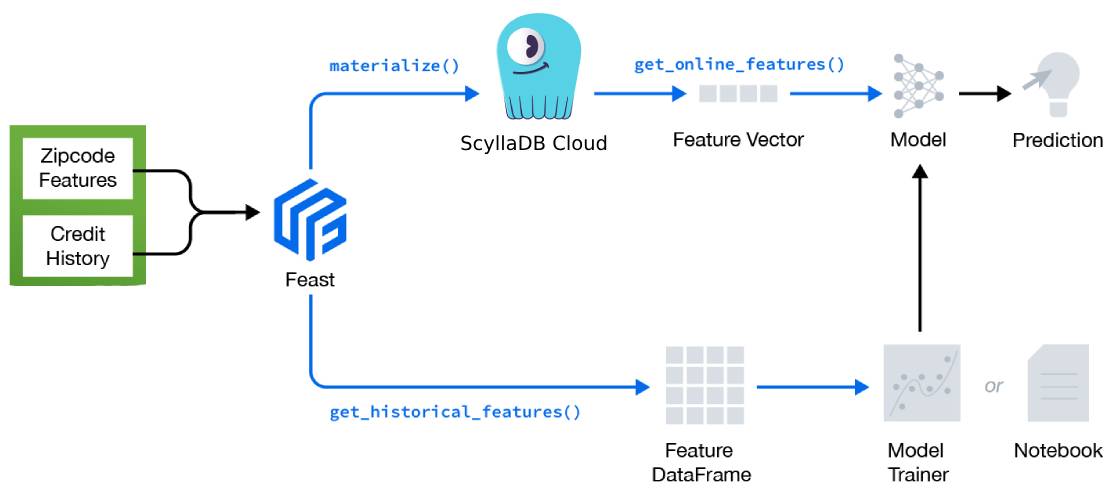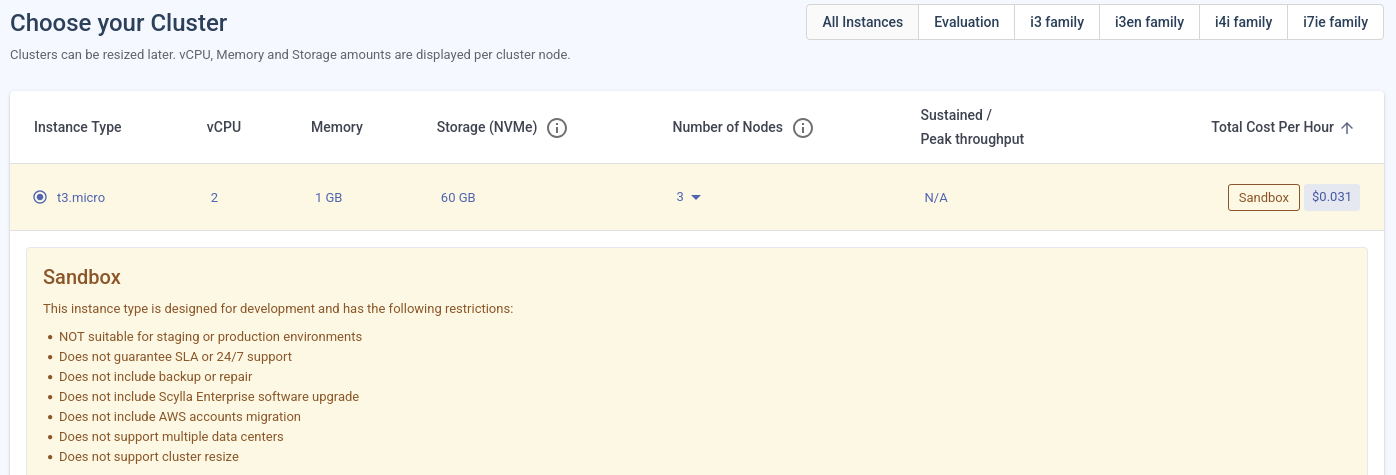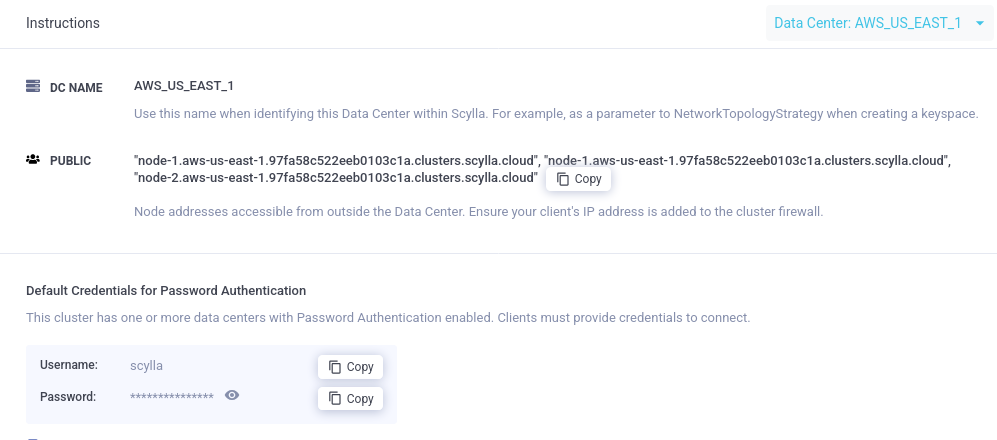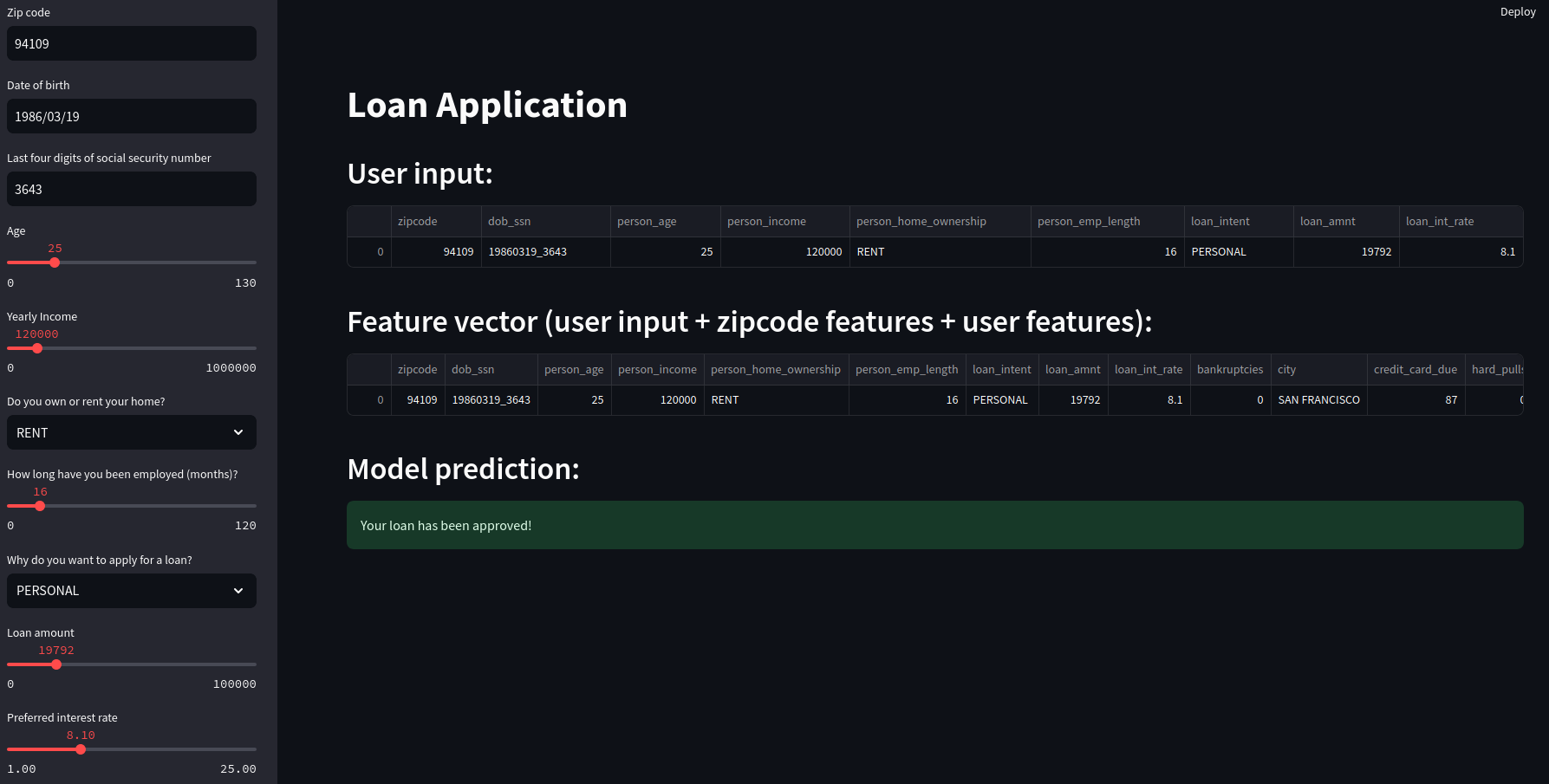Was this page helpful?
Real-time credit scoring application with Feast & ScyllaDB¶
This repository is based on this existing Feast sample application.

This sample project is a real-time credit scoring application example that shows you how to set up Feast with ScyllaDB Cloud as an online store and parquet files as offline store.
Requirements¶
Python 3
Get started¶
Clone the repository:
git clone https://github.com/zseta/scylladb-feast
cd scylladb-feast
Project details:
The primary training dataset is in
loan_table.parquet. This file contains historic loan data with accompanying features. The dataset also contains a target variable, namely whether a user has defaulted on their loan.Feast is used during training to enrich the loan table with
zipcodeandcredit historyfeatures from other parquet files.Feast is also used to serve the latest
zipcodeandcredit historyfeatures for online credit scoring using ScyllaDB Cloud.
In this tutorial, you’ll do the following steps:
Create a new ScyllaDB Cloud cluster
Create a new keyspace for the feature store
Install dependencies and configure Feast
Deploy and test the feature store
Create ScyllaDB Cloud cluster¶
Go to ScyllaDB Cloud and create a new cluster (either “Free Tial” or “Dedicated VM”). You can use the smallest available machine for this sample app (t3.micro)

Create new keyspace¶
Install CQLSH command line tool and connect to the ScyllaDB cluster:
pip install cqlsh
cqlsh <SCYLLA-CLOUD-HOST> -u scylla -p <PASSWORD>
You can get the host address, username, and password from your ScyllaDB Cloud dashboard:

Create a new keyspace called feast in ScyllaDB (this keyspace will be populated by Feast):
CREATE KEYSPACE feast WITH replication = {'class': 'NetworkTopologyStrategy', 'replication_factor': '3'} ;
Install dependencies and configure Feast¶
Create a new Python environment and install dependencies:
virtualenv env && source env/bin/activate
pip install -r requirements.txt
Next, configure ScyllaDB Cloud as the online store for Feast.
[!TIP] ScyllaDB is compatible with Apache Cassandra so you can use the Feast Cassandra connector with ScyllaDB
Open the feature_store.yaml file and add the host addresses, username (scylla), and password for ScyllaDB:
project: repo
# By default, the registry is a file (but can be turned into a more scalable SQL-backed registry)
registry: data/registry.db
# The provider primarily specifies default offline / online stores & storing the registry in a given cloud
provider: local
online_store:
type: cassandra
hosts:
- x.x.x.x
- x.x.x.x
- x.x.x.x
username: scylla
password: pass
keyspace: feast
entity_key_serialization_version: 2
You can get these values from the ScyllaDB Cloud dashboard.
Deploy and test the feature store¶
Deploy the feature store by running apply from within the feature_repo/ folder
cd feature_repo/
feast apply
Deploying infrastructure for credit_history
Deploying infrastructure for zipcode_features
This commmand also generates a registry.db file in your data/ folder containing Feast configuration information.
Next, load features into the online store using the materialize-incremental command. This command loads the
latest feature values from a data source (parquet files, in our case) into the online store (ScyllaDB).
CURRENT_TIME=$(date -u +"%Y-%m-%dT%H:%M:%S")
feast materialize-incremental $CURRENT_TIME
The loading process starts:
35%|███████████████████▋ | 9965/28844 [01:20<02:39, 118.37it/s]
When it’s completed, train the model using run.py (in the root folder of the repository)
cd ..
python run.py
The script returns the result of a single loan application:
Loan rejected!
You can also run feast ui to explore your features:
feast ui
Open http://0.0.0.0:8888

Interactive demo¶
Run the Streamlit app locally:
streamlit run app.py
Go to http://localhost:8501

You can modify the variables on the left sidebar then the app will automatically run the prediction using the model.
